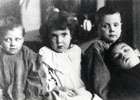Life of poisoning and poverty for Victorian children revealed in online database

Family historians and academics from around the world can now access almost 12,000 records detailing the treatment of children admitted to the Glasgow Hospital for Sick Children from 1883, when the first patients were admitted, to 1903.
The site allows visitors to trace the stories of ill and impoverished children, such as the seven youngsters admitted on 20 July 1900 suffering from poisoning after eating what they thought was treacle. Police investigation revealed that the children had actually been eating belladonna, in the form of a sore throat remedy used by a local stable owner to treat his horses. One of the children was described as "wildly delirious"; he "shouted incoherently and his eyes jerked from side to side". Happily, he survived - as did the other children - and was back home within a week.
The project, led by Dr. Sue Hawkins at Kingston University in south-west London, involved scanning and copying the admissions registers stored at the hospital's archives. These were then distributed to volunteers charged with the task of deciphering the often difficult to read handwriting and painstakingly inputting the information into a database.
Dr. Hawkins noted that respiratory problems and tubercular disease were rife among the young Glaswegian patients because of the poor, overcrowded conditions endured by the swathes of the city's population living in huge tenements containing 100 or more people in each building.
"However, it's not a story of gloom and doom," she added. "The hospital was very successful in treating children: most were cured and discharged and their lives can be followed in census and other records showing they grew up to have children of their own."
The database accompanies the databases for the Great Ormond Street, Evelina and Alexandra hospitals for children, all of which are in London. The databases can all be accessed free of charge on the Historic Hospital Admission Records Project (HHARP) website, which is launching formally today at the Wellcome Trust. The website, which was first set up in 2007 under the name 'Small and Special', now holds 120,000 records.
Alma Topen, a hospital Archivist involved in the project, said: "This is a very important project, which will open up the hospital admissions registers to a global audience. Having these available online will increase their usage considerably and will provide valuable research material for medical, social and family historians."
The databases include patients' names, age, sex, admission date, address, disease, treatment and outcome, and the website provides background information, including photographs and histories of some of the nurses and doctors who worked at the hospital.
The Glasgow Hospital for Sick Children was originally located in the Garnethill area of the city and later moved west to Yorkhill, where it remains and is now known as the Royal Hospital for Sick Children, Glasgow. It was one of the last 19th-century children's hospitals to open in a major British city.
The purpose of the hospital was "the medical and surgical treatment of poor children suffering from non-infectious diseases". Children showing symptoms of infection after admission were put in isolation and moved to Belvidere Hospital as quickly as possible.
Very few records from British children's hospitals have survived from Victorian times; most were destroyed or have disappeared. Dr. Hawkins said that in future, she would like to be able to digitise Britain's only two other surviving sets of 19th-century children's admission records, from Edinburgh and Aberdeen hospitals.
More information: hharp.org/















